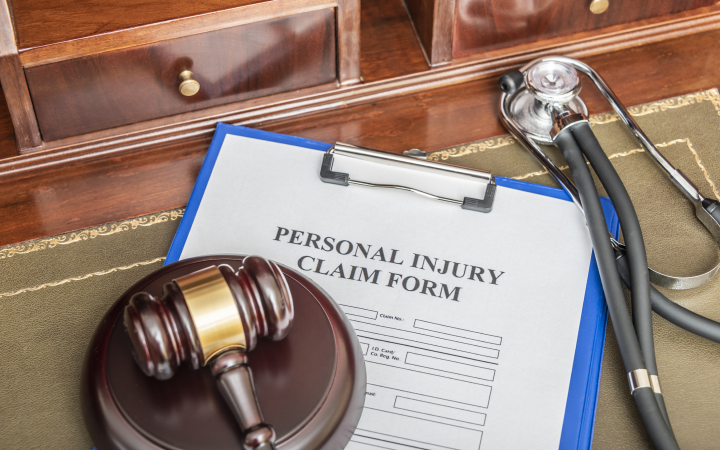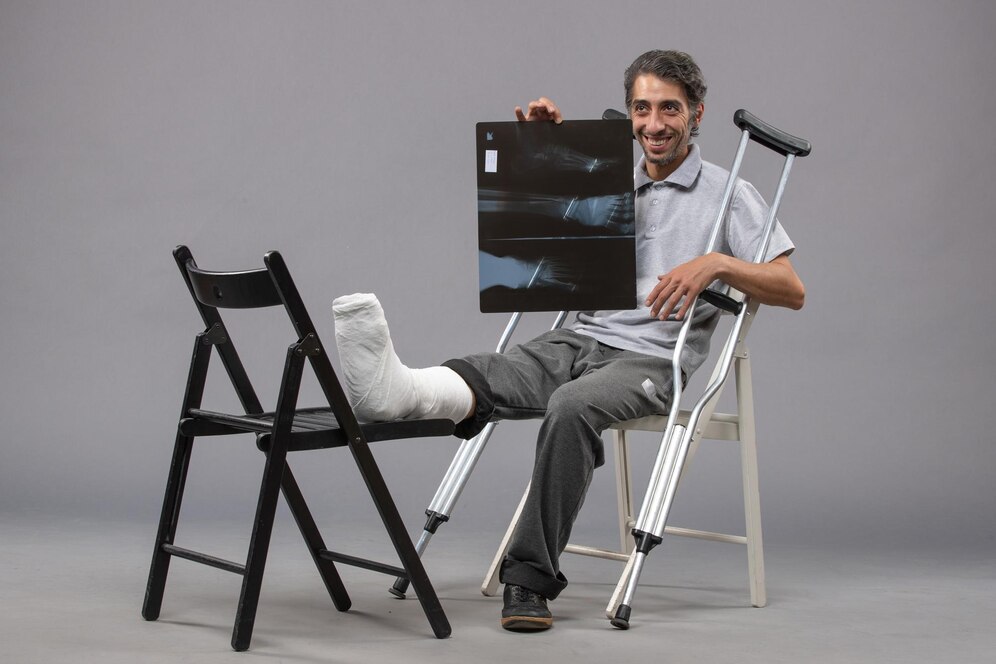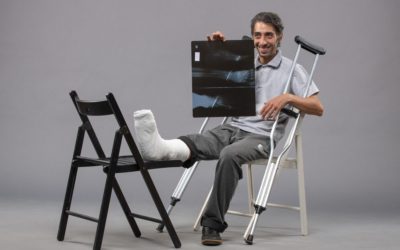If you’ve been injured, the last thing you need is misinformation holding you back. Myths about personal injury claims can stop you from taking action, leaving you with unanswered questions about your rights and financial recovery.
These misconceptions often discourage people from getting the help they deserve or lead to confusion about their options. In this blog, we’ll uncover 10 common myths about personal injury claims and explain the truths behind them. Whether you’re dealing with medical bills, lost wages, or emotional stress, understanding these realities can help you take control of your recovery.
Common Misconceptions About Personal Injury Claims
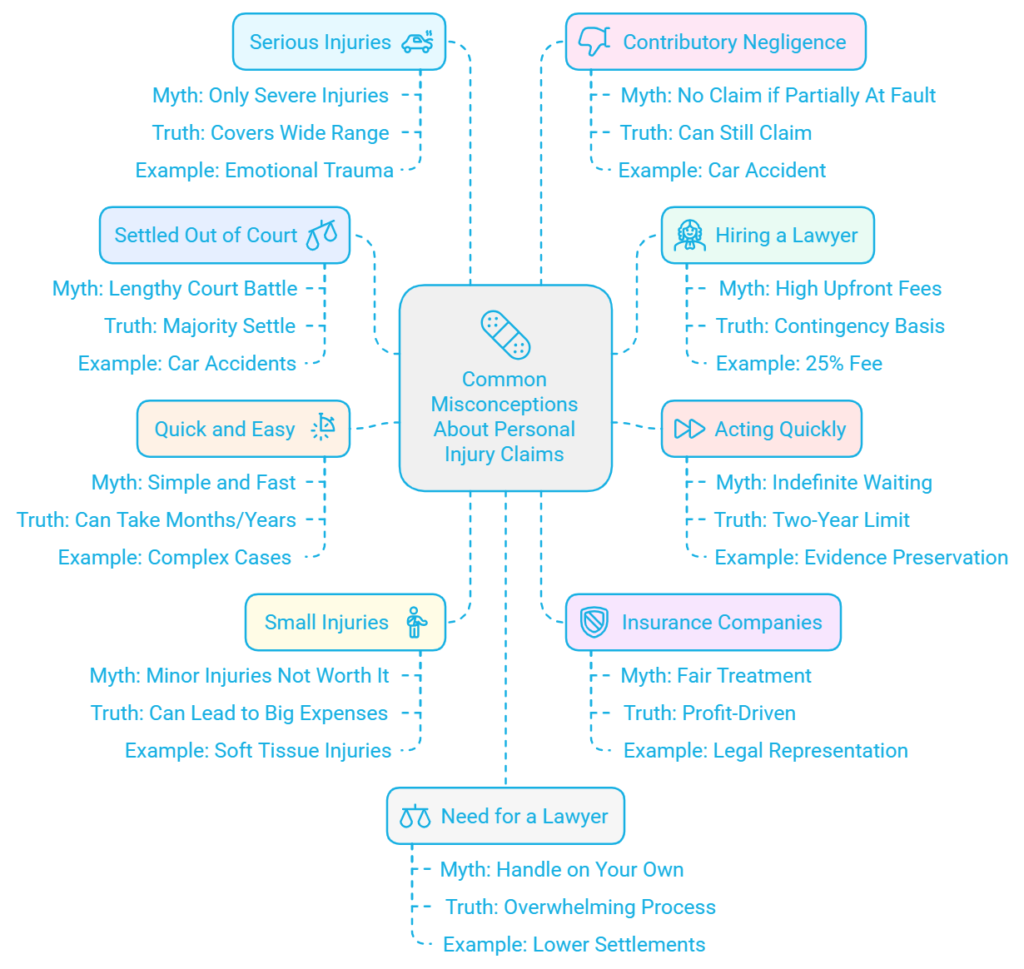
1. Most Personal Injury Claims Are Settled Out of Court
Myth: Every claim leads to a lengthy court battle.
Truth: The majority of personal injury claims are resolved without going to court. Lawyers and insurance companies often negotiate settlements to save time and reduce stress.
Only a small percentage of cases go to trial, usually when fault or damages are heavily disputed. For example, straightforward car accident cases with clear liability often settle quickly, while more complex disputes may require legal action.
2. Hiring a Lawyer Doesn’t Have to Be Expensive
Myth: Personal injury lawyers charge high upfront fees, making legal help inaccessible.
Truth: Most personal injury lawyers in Nova Scotia work on a contingency fee basis. This means you don’t pay anything upfront. The lawyer only gets paid if your case succeeds, taking a percentage of the settlement.
For example, if your lawyer charges 25% and you receive a $40,000 settlement, their fee would be $10,000. This makes legal representation affordable, even if you’re facing financial challenges. Learn more about preparing for a consultation in this guide.
3. Acting Quickly Helps Protect Your Rights
Myth: You can wait indefinitely to file a claim.
Truth: In Nova Scotia, personal injury claims must be filed within two years of the incident. Waiting beyond this period may mean forfeiting your right to recover damages, no matter how strong your case.
Acting quickly ensures that evidence is preserved and that witnesses’ memories remain reliable. Learn more about the statute of limitations on the Nova Scotia Legislature website.
4. Personal Injury Claims Are Quick and Easy
Myth: The process of obtaining compensation is simple and fast.
Truth: Personal injury claims can take months—or even years—depending on the complexity of the case. Disputes over fault, ongoing medical treatment, and negotiations often delay resolutions.
In Canada, the average personal injury claim takes 6 months to 2 years to settle. A straightforward car accident case might resolve faster, but claims involving severe injuries or legal disputes typically take longer. Consulting a lawyer can help streamline the process and set realistic expectations.
5. Even Small Injuries Can Lead to Big Expenses
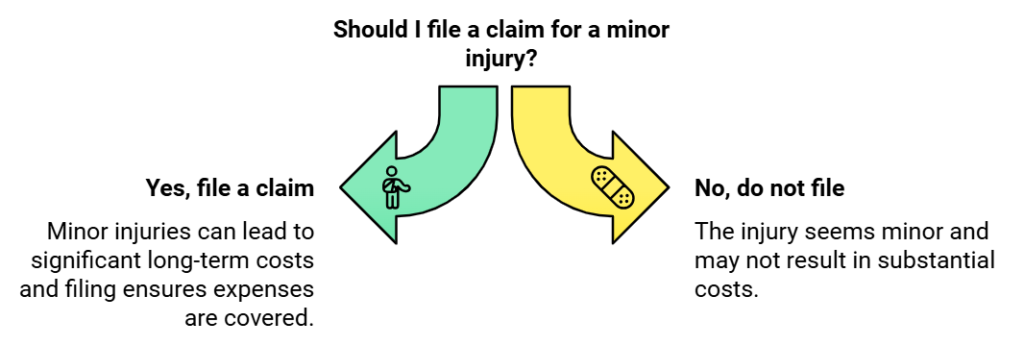
Myth: Minor injuries aren’t worth filing a claim for.
Truth: Injuries that seem minor at first can result in significant long-term costs. Soft tissue injuries or concussions might not seem serious initially but could require costly medical treatment or lead to chronic pain.
For example, a slip-and-fall on icy stairs might result in mild back pain, but untreated injuries could lead to mobility issues or expensive therapy. Filing a claim ensures these expenses are covered.
Related Reading:
- Traumatic Brain Injury: Long-Term Impacts – Explore how even mild traumatic brain injuries can have lasting effects.
- Legal Advice on Traumatic Brain Injury (TBI) – Learn how to handle injuries with long-term consequences.
6. Insurance Companies Don’t Always Have Your Best Interests at Heart
Myth: Insurance companies will treat you fairly.
Truth: Insurance companies prioritize their profits and may offer settlements that don’t reflect the true cost of your losses. They might downplay your injuries or push for quick agreements to avoid larger payouts.
According to industry studies, victims with legal representation receive up to 3.5 times more compensation than those who handle claims alone. Working with a lawyer ensures your claim is reviewed fairly and valued appropriately.

7. You Have to Be Seriously Injured to File a Claim
Myth: Only severe injuries justify filing a personal injury claim.
Truth: Personal injury claims can cover a wide range of damages, including minor injuries, emotional trauma, and property damage. These losses can have financial and psychological consequences that are worth addressing.
For instance, if you experience anxiety following a car accident or need ongoing physical therapy, you can file a claim to address these damages, even if your physical injuries appear minor.
8. Contributory Negligence Still Allows You to Claim Compensation
Myth: You can’t file a claim if you’re partially at fault for the accident.
Truth: In Nova Scotia, contributory negligence laws allow you to recover damages even if you share some responsibility for the accident.
For instance, if you’re found 25% at fault, you can still claim 75% of your damages. Imagine being in a car accident where you were speeding, but the other driver ran a red light. While both parties are partly to blame, you’re still entitled to compensation.
9. Filing a Claim is About Accountability, Not Greed
Myth: Filing a claim is greedy.
Truth: Pursuing a personal injury claim is about holding the responsible party accountable and covering your financial losses. Compensation helps pay for medical bills, lost income, and other damages caused by the injury.
For example, if you’ve been unable to work and need ongoing treatment, filing a claim ensures you won’t be stuck paying these costs out of pocket. Seeking damages is your legal right and a step toward recovery.
10. You Don’t Need a Lawyer for Your Claim
Myth: You can handle a personal injury claim on your own.
Truth: While it’s possible to file a claim independently, navigating the legal process can be overwhelming. Insurance companies often take advantage of individuals without representation, offering lower settlements or delaying payouts.
Hiring a lawyer ensures your case is handled professionally and that you receive the compensation you deserve. Discover the benefits of hiring a personal injury lawyer to understand how legal guidance makes a difference.
Conclusion
Navigating personal injury claims can be challenging, but understanding the facts can help you avoid costly mistakes. By debunking these 10 common myths about personal injury claims, you can take the necessary steps to recover financially and emotionally.
Don’t let misconceptions hold you back. Seek professional advice, protect your rights, and focus on rebuilding your life.
If you’ve been injured and want to understand your options, schedule a free consultation with a personal injury lawyer in Bedford or visit our Contact Us page. Let us help you get the justice you deserve.
FAQ: Common Questions About Personal Injury Claims
1. Do all personal injury claims go to court?
No, most personal injury claims are settled out of court through negotiations with insurance companies. Trials only happen when there are disputes over fault or the amount of compensation.
2. Can I file a personal injury claim if I feel fine after the accident?
Yes, you can. Some injuries, like whiplash or concussions, may not show symptoms right away. It’s important to see a doctor and consult a lawyer to protect your rights in case symptoms develop later.
3. What happens if I’m partly to blame for the accident?
You can still file a claim. In Nova Scotia, contributory negligence laws let you recover damages even if you’re partially at fault. Your compensation will be reduced based on your share of responsibility.
4. Will filing a personal injury claim raise my insurance premiums?
No, filing a claim against someone else’s insurance won’t affect your premiums. Your own insurance rates might only change if you were at fault or made a claim with your own policy.
5. Can I include emotional distress in my personal injury claim?
Yes, emotional distress, anxiety, PTSD, and other psychological impacts are considered “non-economic damages” and can be included in your claim.

